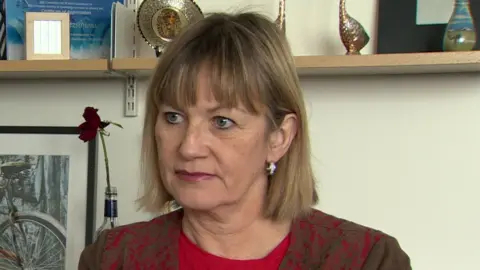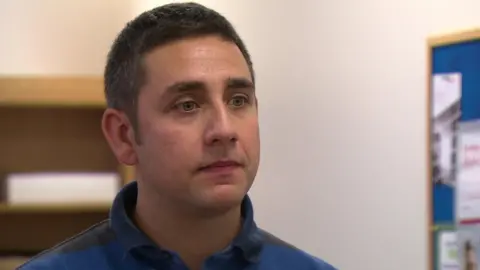Discovering a latent passion for nursing
It's a job that can come with long hours and irregular shift patterns, so why would you want to be a nurse?
And why, in particular, would you choose to do it when you're a bit older than the average student?
Lisa Heaney and William Stritzel both went to Queen's University Belfast to study nursing when they were in their 30s.
Lisa, a mum of three, had been working as a classroom assistant before she started the degree.
She had to continue to work and study at night before she got on the course.
"It's a full-time course - 50% practical and 50% in university," she says.
To make it work, she had a lot of juggling to do, and had to be well organised.
 Getty Images
Getty ImagesLisa says it was not an easy task trying to balance being a parent, attending school events, helping her children with homework and other things while meeting the demands of her degree.
However, she thinks older nursing students bring a bit of life experience to the job.
She also felt she was "more focused, more driven" because she knew it was something that she wanted to do, whereas when she was younger, she wasn't sure.
'Lot to offer'
Donna Fitzsimmons, head of the School of Nursing and Midwifery at Queen's University, agrees that students like Lisa bring something different to the job.

She says a third of their intake is currently students coming through access courses "a little later in life" and that their life skills are a great help on the job.
Employers tell her that the older students have a lot to offer in a clinical environment.
Only a third of students on the degree course come straight from school.
The other third already have a degree in something else.
As of September 2018, there were 1,972 nursing and midwifery vacancies actively being recruited to in Northern Ireland.
At the same time, there were 17,153 nursing and midwifery staff in post.
While the degree course attracts all ages, it still doesn't manage to attract a great deal of men.
Last year less than 10% of the students were men. Three years ago it was less than 5%.
William Stritzel, who just graduated from nursing in June, knows he's very much in the minority, not just on the course but in the nursing profession itself.
But he thinks things are changing, albeit slowly.

For William, being a nurse was always a dream, but he admits he has found it difficult and there were times he just wanted to give up.
He says financial issues were a concern, like when his car broke down and he needed to find money to buy a new one, something which was difficult while living on a bursary.
But he's glad he stuck with it and he's still studying, now for a PhD, something he thought he would never do.
"I finished school when I was 16 so I'd not been in education for 13 years when I went back," he says.
He said he would encourage others to follow their dreams and made a promise to himself to do that after he had children.
"I can't say to my children to follow their dreams if I don't follow my own dreams."
